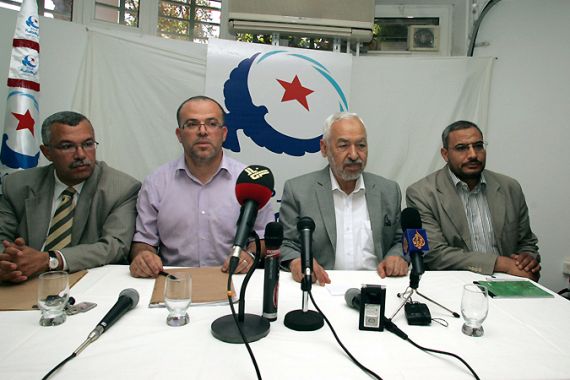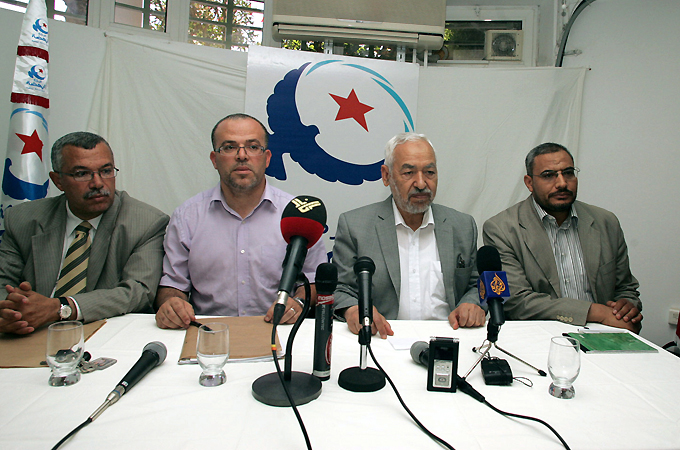Tunisians undecided ahead of October vote
Pro-democracy Islamists poll strongly, but voting survey shows most Tunisians are still to make up their minds.

 |
| Al-Nahda, led by Rachid Ghannouchi, second right, are considered frontrunners for October’s vote [EPA] |
More than half of Tunisians do not know who they will vote for in October’s elections, according to a poll partly sponsored by Al Jazeera.
The faultline between those who would like to see an Islamist form of governance and those who wish to see the secularism established under President Habib Bourguiba maintained is fast becoming a defining divide in the nascent democracy.
Religious tension is rising over the limits of freedom of expression, as Islamists challenge the dominance of liberals in what was once a citadel of Arab secularism.
An opinion poll on Tunisia’s political climate conducted by Al Jazeera Centre for Studies and Media Scan has further underlined how this divide is being reflected in terms of political preferences.
With 54 per cent of Tunisians yet to decide who they will cast their vote for, according to Al Jazeera’s poll, it is clear that the campaign period will be crucial. Most of the newly formed political parties remain completely unknown to the public.
Of those who have made up their minds, 21 per cent of respondents said they would vote for Rachid Ghannouchi’s al-Nahda, followed by Ahmed Nejib Chebbi’s Progressive Democratic Party (PDP) with eight per cent, and the Tunisian Communist Workers’ Party with five per cent.
Al-Nahda, a pro-democracy Islamist party, is considered to be one of the frontrunners in elections for the constituent assembly scheduled for October.
The leader of the PDP, which seeks to be an alternative to the Islamists, has also been critical of the reform panel, because its members are not elected.
The majority of Tunisians would prefer a parliamentarian system, according to the poll.
Tunisians will be voting for a constituent assembly in October, which will be tasked with writing a new constitution, and deciding on the shape of the country’s future political system.
Forty-seven per cent of respondents believe a parliamentarian system is in the country’s best interests, while 26 per cent wish to see some form of presidential system maintained.
As for political ideology, respondents were asked to rank how strongly they identified with five political ideologies, including Islamism, Arab Nationalism, liberalism, communism and socialism.
Some 47 per cent of the Tunisians polls said they strongly agreed with political Islam, 19 per cent with Arab nationalism and 19 per cent with liberalism. Only six per cent felt strongly in favour of communism or socialism, respectively.
A total of 1,244 respondents were polled between May 28 and June 2.
Political financing debated
A commission tasked with drafting a law on the financing of political parties postponed a decision Wednesday, because of a dispute among its members over its contents.
The panel failed to agree on a text, following five hours of talks the previous day.
Yadh Ben Achour, president of the commission, said it was better to put off the talks for a week so as to have everybody present and thus ensure a degree of consensus.
“We are trying to overcome the crisis at the heart” of the committee, he said.
Differences were to be expected given the diverse nature of its membership, he added.
The committee had been due to debate the text again on Wednesday.
Proposals include a ban on any foreign financing of political parties and a limit to how much private individuals can contribute.
But the main political parties, concerned at the effect such restrictions might have on them, have fiercely criticised such measures.
One of the parties most hostile to the proposals is al-Nahda, which in June was among a number of political groups to pull out of the national commission, questioning its legitimacy.
The PDP has also been critical of the reform panel, because its members are not elected.